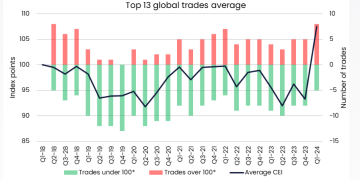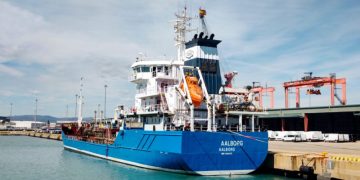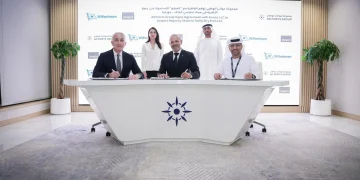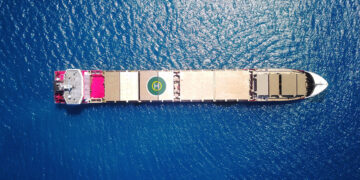Experts from the Watson Farley & Williams explain how a new Code of Private Maritime Law (the New Code) will impact the Greek national maritime legislation.
The New Code, which comes into force on 1 May 2023, replaces the existing code which dates back to 1958, establishing a legal framework for an electronic operation of the register among others, argue Valina Giouzelaki and Matina Kanellopoulou.
The New Code’s provisions aim at:
- restoring coherence to the code, which has changed considerably following the ratification of numerous international conventions;
- enhancing the legal certainty and transparency for transactions regarding the operation and legal status of ships;
- regulating modern forms of maritime activity that were previously overlooked, whilst reforming existing regulations that have in practice proved to be incomplete, inadequate, or outdated, such as the maritime insurance and chartering regimes;
- modernising the legal framework of the code through the digital operation of the register; and
- protecting the rights of seafarers by providing for the most appropriate solutions to safeguard the position of Greek seafarers in every aspect of their professional life.
Please find following an outline of several of the New Code’s key provisions.
A. Broader definition of a “ship”
- the New Code redefines and broadens the legal concept of what is considered a “ship” in line with the technical and scientific consensus;
- and the concept of a “floating craft” is introduced to cover floating platforms and storages, floating constructions, cranes and platforms.
B. Digitalisation of the Ship Registry
The long-standing policy of port authorities for records being kept in the form of hard copies and handwritten entries in their records is to be abolished, with the New Code establishing a legal framework for an electronic operation of the register, namely:
- electronic record keeping and e-filing;
- submitting documents by electronic means provided they bear an approved e-signature; and
- issuing certificates (including nationality certificates), attestations and other documents in digital form.
C. Simple and Preferred Ship Mortgage
The New Code includes unified provisions for the constitution of both simple and preferred mortgages over a ship; accordingly, legislative decree 3899/1958 on preferred mortgages is to be abolished.
Although, the New Code in many instances repeats rules that are already applicable, several new rules are being introduced, notably including the following:
- tonnage restriction for a preferred mortgage: although the New Code retains the tonnage restriction for the registration of a preferred mortgage (i.e. only ships with a gross tonnage equal or over 500 grt can be encumbered with a preferred mortgage), it also introduces the possibility of reducing said tonnage restriction upon issue of a relevant presidential decree;
- mortgage over ships under construction: the New Code allows for the constitution of a simple or preferred mortgage over a ship under construction;
- ranking: the New Code provides that the time determining the ranking of a mortgage (either simple or preferred) is the time of submission of the relevant petition for the registration of the mortgage with the competent ship registry. This is currently the rule for determining the ranking of mortgages over ships registered in accordance with the ministerial decisions issued pursuant art. 13 of L.D. 2687/1953 and differs from the general rule, which provides that mortgages registered on the same day have the same ranking;
- invalidity of mortgage registered after an attachment: the New Code amends the previous rule that any mortgage registered after the registration of an attachment is erga omnes invalid and provides that any such mortgage shall be invalid only towards the party imposing the attachment; and
- compulsory revocation of mortgage in case of bankruptcy: the New Code extends the application of the bankruptcy code provision according to which any mortgage granted within six months prior to the “suspect period” and until the declaration of bankruptcy is subject to compulsory revocation; it is highlighted however that the exceptions applicable to mortgages that secure loans are still applicable.
D. Maritime liens
The New Code reinstates the basic characteristics of maritime liens (i.e. that they are imposed directly by law, “follow” the claim they secure and rank ahead of any mortgage and other subordinate claims) and determines their debtor in a general manner, capturing both the owner and the operator of the ship. It is worth mentioning that pursuant to the New Code:
- maritime liens rank ahead of any mortgage (as is the common international practice) with the exception of mortgages over ships registered in accordance with the ministerial decisions issued pursuant art. 13 of L.D. 2687/1953, in which case such mortgage outranks any maritime liens;
- liens refer to the ship and are not extended to the fare;
- costs incurred by creditors for the commencement of the enforcement procedure against a ship are deducted from the enforcement proceeds and are not included in the creditors’ list. The same applies for any costs made for guarding a ship following its attachment;
- first class liens (shipping taxes, duties and rights that burden the ship) remain unchanged. However, liens for duties and rights that burden a ship will secure such a claim up to the amount reached during the last six months prior to its attachment;
- second class (captain and crew wages, social security funds), third class (assistance at sea claims) and the fourth class liens (ships collision claims) remain unchanged;
- liens “survive” the contractual sale of a ship, provided that the person in favour whom the lien is created files a relevant lawsuit for the recognition of such lien within three months from the registration of the sale with the competent ship registry. The above deadline is one year for the recognition of liens for the captain and crew’s wages; and
- liens are released following the sale of a ship through public auction, though a creditor whose claim has not been fully satisfied still has the right to pursue it with the new owner of said ship.
E. Transfer of obligations after transfer of ship
- under the previous code, the transfer of a ship could be considered as a transfer of business, with the seller and buyer being jointly and severally liable for any existing liabilities in connection with the ship. This is now to be abolished and the buyer will no longer liable for any such debt of the previous owner. However, creditors’ rights are still protected to a certain extent as:
a. this new rule does not apply in connection with maritime liens which are transferred to the new owner of a ship; and
b. the general provisions of Greek law for creditors’ protection against fraudulent transfers of assets also offer sufficient protection.
F. Ship operation
- the legal regime for ship operation (efoplismos) is redefined in line with international conventions;
- the New Code clarifies that the cessation of a ship’s operations may either be declared by a common statement of the shipowner and ship operator or, in the event of dispute, following a court order; and
- the New Code provides that the applicable law governing the liability of a shipowner for claims arising from the operation of a ship is the law which is the most appropriate taking into account the relevant circumstances (i.e. flag of ship, jurisdiction of the parties, place where the relevant agreements was concluded and/or performed, and any choice of law agreed between shipowner and ship operator).
“The concept of ship arrests as interim measures to be used on an emergency basis will be governed by the Brussels 1952 International Convention and the Greek Code of Civil Procedure.”
G. Administration and marine agency
- the concepts of ship administrator and ship agent are introduced.
H. Pollution liability
- the New Code cross-refers to international conventions in relation to oil pollution liability, diesel fuel pollution liability, third party liability arising from diesel fuel pollution and hazardous and noxious substances liability.
I. Modernisation of chartering provisions
- a broader definition is given to the concept of a “charterparty”, which now also includes the use of a ship or floating craft as permanent or temporary storage of oil and other petroleum products, or the chartering of drilling vessels;
- emphasis is given to the primacy of contractual freedom doctrine in line with international shipping practice;
- bareboat charters and contracts of affreightment are officially introduced as types of chartering. The list is non-exhaustive however since the constantly evolving nature of shipping industry practice is creating hybrid conventional forms to meet ever-changing transport needs; and
- the rules of governing carriage of goods by sea are reformed in accordance with the Hague-Visby Rules.
J. Enforcement
- the concept of ship arrests as interim measures to be used on an emergency basis will be governed by the Brussels 1952 International Convention (to the extent applicable) and the Greek Code of Civil Procedure;
- the New Code also provides for payment of damages in the event of detention or arrest of a ship when a plaintiff requesting the imposition thereof as interim measures has acted in bad faith;
- a time limit of five days from the service of an enforcement order has been set for the commencement of the enforcement proceedings, following which a ship’s sailing may no longer be prohibited;
- English law concept of “court approved sale” is introduced; and
- the legal consequences of the registration of an auction sale effected abroad are made equivalent to those for auction sales effected in Greece.
Athens Trainee Constantina Koutsoumpa-Santos also contributed to this article.
Above article has been initially published on WFW website and is reproduced here with kind permission
The views presented are only those of the author and do not necessarily reflect those of SAFETY4SEA and are for information sharing and discussion purposes only.





























































